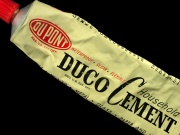Difference between revisions of "Duco"
Jump to navigation
Jump to search
m (Text replace - "== Authority ==" to "== Sources Checked for Data in Record ==") |
|||
| Line 18: | Line 18: | ||
R. Lodge, "A History of Synthetic Painting Media with Special Reference to Commercial Materials", AIC Preprints, New Orleans, LA, 1988. | R. Lodge, "A History of Synthetic Painting Media with Special Reference to Commercial Materials", AIC Preprints, New Orleans, LA, 1988. | ||
| − | == | + | == Sources Checked for Data in Record == |
* Thomas Gregory, Thomas Gregory, ''The Condensed Chemical Dictionary'', Reinhold Publishing, New York, 3rd ed., 1942 | * Thomas Gregory, Thomas Gregory, ''The Condensed Chemical Dictionary'', Reinhold Publishing, New York, 3rd ed., 1942 | ||
Revision as of 19:56, 30 April 2016
Description
[DuPont] A registered trademark for a series of cellulose nitrate adhesives, enamels, waxes and lacquers. Duco lacquers and enamels have been used for automobile and furniture finishes. Some artists experimented with their use for paintings in the 1930's and 40's (Lodge, 1988). Duco cement has been used as a temporary adhesive for repairing broken glass as the refractive index of cellulose nitrate is similar to glass. With age, it yellows, becomes brittle and looses adhesion.
Synonyms and Related Terms
pyroxylin lacquer
Hazards and Safety
Devcon: MSDS
Additional Information
Devcon: Website
R. Lodge, "A History of Synthetic Painting Media with Special Reference to Commercial Materials", AIC Preprints, New Orleans, LA, 1988.
Sources Checked for Data in Record
- Thomas Gregory, Thomas Gregory, The Condensed Chemical Dictionary, Reinhold Publishing, New York, 3rd ed., 1942
- G.S.Brady, G.S.Brady, Materials Handbook, McGraw-Hill Book Co., New York, 1971 Comment: p. 172
- Ralph Mayer, Ralph Mayer, A Dictionary of Art Terms and Techniques, Harper and Row Publishers, New York, 1969 (also 1945 printing)
